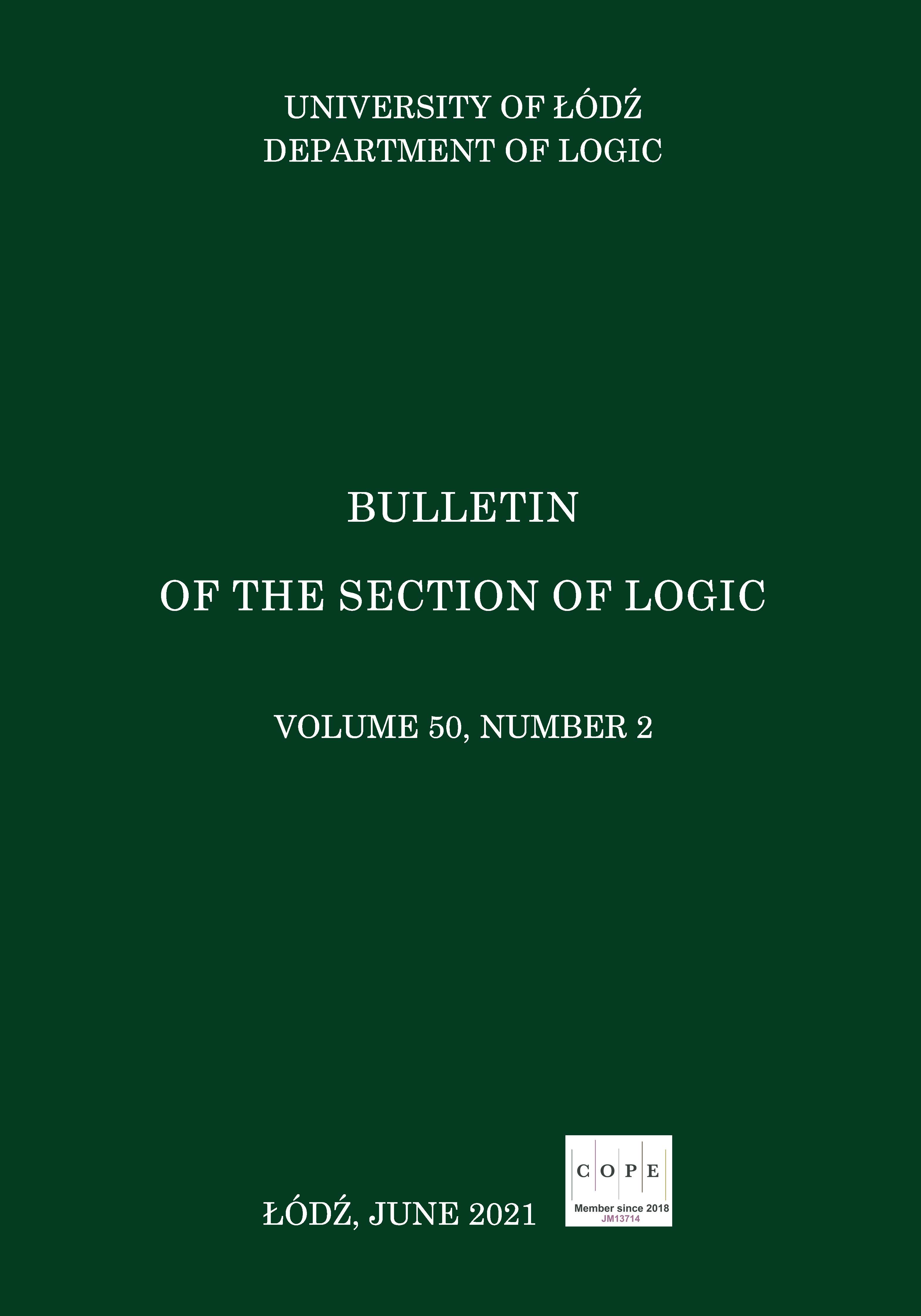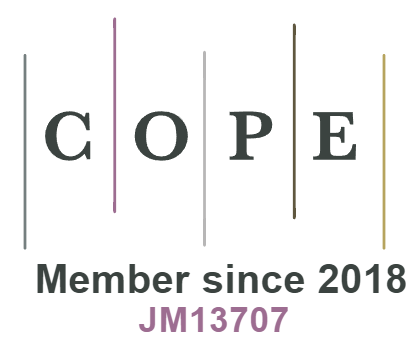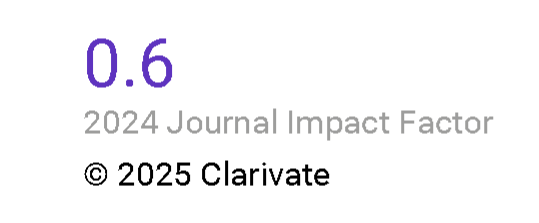The Good, the Bad and the Right: Formal Reductions among Deontic Concepts
DOI:
https://doi.org/10.18778/0138-0680.2021.05Keywords:
awfulness, explicit permission, Hohfeldian relations, ideality, moral values, obligationAbstract
The present article provides a taxonomic analysis of bimodal logics of normative ideality and normative awfulness, two notions whose meaning is here explained in terms of the moral values pursued by a given community. Furthermore, the article addresses the traditional problem of a reduction among deontic concepts: we explore the possibility of defining other relevant normative notions, such as obligation, explicit permission and Hohfeldian relations, in terms of ideality and awfulness. Some proposals in this respect, which have been formulated in the literature over the years, are here improved and discussed with reference to the various logics that we will introduce.
References
[1] A. Anderson, The formal analysis of normative systems, [in:] N. Rescher (ed.), The Logic of Decision and Action, University of Pittsburgh Press (1967), pp. 147-213.
Google Scholar
[2] L. Aqvist, Deontic logic, [in:] Handbook of Philosophical Logic, vol. 8, Springer Netherlands (2002), pp. 147-264, DOI: https://doi.org/10.1007/978-94-010-0387-2_3
Google Scholar
DOI: https://doi.org/10.1007/978-94-010-0387-2_3
[3] P. Cane, Responsibility in Law and Morality, Hart Publishing (2002).
Google Scholar
[4] W. Carnielli, C. Pizzi, Modalities and Multimodalities, Springer (2008), DOI: https://doi.org/10.1007/978-1-4020-8590-1
Google Scholar
DOI: https://doi.org/10.1007/978-1-4020-8590-1
[5] M. de Boer, D. M. Gabbay, X. Parent, M. Slavkovic, Two dimensional Standard Deontic Logic [including a detailed analysis of the 1985 Jones-Pörn deontic logic system], Synthese, vol. 187 (2012), pp. 623-660, DOI: https://doi.org/10.1007/s11229-010-9866-4
Google Scholar
DOI: https://doi.org/10.1007/s11229-010-9866-4
[6] S. Hansson, The varieties of permission, [in:] D. Gabbay, J. Horty, X. Parent, R. van der Meyden, L. van der Torre (eds.), Handbook of Deontic Logic and Normative Systems, College Publications (2013), pp. 195-240.
Google Scholar
[7] H. Herrestad, C. Krogh, Obligations directed from bearers to counterparties, [in:] Proceedings of ICAIL 1995 (1995), pp. 210-218, DOI: https://doi.org/10.1145/222092.222243
Google Scholar
DOI: https://doi.org/10.1145/222092.222243
[8] R. Hilpinen, P. McNamara, Deontic logic: a historical survey and introduction, [in:] D. Gabbay, J. Horty, X. Parent, R. van der Meyden, L. van der Torre (eds.), Handbook of Deontic Logic and Normative Systems, College Publications (2013), pp. 3-136.
Google Scholar
[9] W. N. Hohfeld, Some fundamental legal conceptions as applied in legal reasoning, Yale Law Journal, vol. 23 (1913), pp. 16-59.
Google Scholar
DOI: https://doi.org/10.2307/785533
[10] W. N. Hohfeld, Fundamental legal conceptions as applied in judicial reasoning, Yale Law Journal, vol. 26 (1917), pp. 710-770.
Google Scholar
DOI: https://doi.org/10.2307/786270
[11] A. Jones, I. Pörn, Ideality, sub-ideality and deontic logic, Synthese, vol. 65 (1985), pp. 275-290, DOI: https://doi.org/10.1007/BF00869304
Google Scholar
DOI: https://doi.org/10.1007/BF00869304
[12] J. Jorgensen, Imperative and logic, Erkenntnis, vol. 7 (1937{1938), pp. 288-296.
Google Scholar
DOI: https://doi.org/10.1007/BF00666538
[13] T. Libal, M. Pascucci, Automated reasoning in normative detachment structures with ideal conditions, [in:] Proceedings of ICAIL 2019 (2019), pp. 63-72, DOI: https://doi.org/10.1145/3322640.3326707
Google Scholar
DOI: https://doi.org/10.1145/3322640.3326707
[14] H. Prakken, M. Sergot, Contrary to duty obligations, Studia Logica, vol. 57 (1996), pp. 91-105, DOI: https://doi.org/10.1007/BF00370671
Google Scholar
DOI: https://doi.org/10.1007/BF00370671
[15] W. V. O. Quine, On the nature of moral values, [in:] A. I. Goldman, J. Kim (eds.), Values and morals, Springer, Dordrecht (1978), pp. 37-45, DOI: https://doi.org/10.1007/978-94-015-7634-5_3
Google Scholar
DOI: https://doi.org/10.1007/978-94-015-7634-5_3
[16] J. Raz, R. J. Wallace, The Practice of Value, Oxford University Press (2005), DOI: https://doi.org/10.1093/acprof:oso/9780199278466.001.0001
Google Scholar
DOI: https://doi.org/10.1093/acprof:oso/9780199278466.001.0001
[17] M. S. Schwartz, Universal moral values for corporate codes of ethics, Journal of Business Ethics, vol. 59 (2005), pp. 27-44, DOI: https://doi.org/10.1007/s10551-005-3403-2
Google Scholar
DOI: https://doi.org/10.1007/s10551-005-3403-2
[18] M. Sergot, Normative positions, [in:] D. Gabbay, J. Horty, X. Parent, R. van der Meyden, L. van der Torre (eds.), Handbook of Deontic Logic and Normative Systems, College Publications (2013), pp. 353-406.
Google Scholar
[19] J. Sullins, Information Technology and Moral Values, [in:] E. N. Zalta (ed.), The Stanford Encyclopedia of Philosophy, spring 2021 ed., Metaphysics Research Lab, Stanford University (2021), https://plato.stanford.edu/archives/spr2021/entries/it-moral-values/
Google Scholar
Downloads
Published
How to Cite
Issue
Section
License

This work is licensed under a Creative Commons Attribution-NoDerivatives 4.0 International License.















